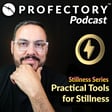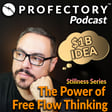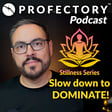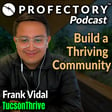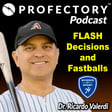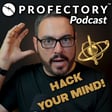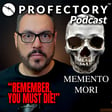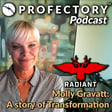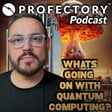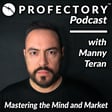Become a Creator today!Start creating today - Share your story with the world!
Start for free
00:00:00
00:00:01

The Stillness Series- Part 2: How Nature Restores the High-Performing Mind
In this second episode of The Stillness Series, we explore how nature can act as a powerful antidote to the chaos of modern life. He shares personal insights from a transformative camping trip that sparked the idea for this series. Backed by science, Manny reveals how nature lowers stress, boosts creativity, and replenishes cognitive energy. Whether you're deep in the woods or stuck in the city, you'll learn practical ways to reconnect with the natural world—and with yourself.
Transcript
Introduction to The Profectory Podcast
00:00:04
Speaker
The Profectory Podcast, Mastering the Mind and Market. Hosted by Manny Turan, we explore what it takes to succeed both in business and within yourself.
00:00:15
Speaker
From a strategy and business growth to mindset and resilience, we provide the tools to lead with clarity, confidence, and wisdom.
Nature as a Catalyst for Growth
00:00:31
Speaker
Welcome to the Profectory Podcast, Mastering the Mind and Market. My name is Manny Turan, and I'm your host. On today's podcast, we are going into part two of the stillness series, and today's episode is about nature as a catalyst.
00:00:49
Speaker
There's something very special about creating space for yourself, especially if it's if it's in nature. If you recall, the reason I started this mini-series is because I went out for a weekend camping trip, and I was able to spend time by myself with friends and family in nature.
00:01:08
Speaker
My phone was out of the way, and that stillness coupled with nature really moved me. So I felt it was really important for me to share with you some really powerful aspects, both on the Stoic side, as well as on the science side of why nature is so important.
Overcoming Burnout Through Nature
00:01:29
Speaker
As you recall, the reason that the whole thing of stillness is important is because when we remember that we have got all these things pulling it at our attention, we have milestones, deadlines, we have team members and family, we have appointments, we have Zoom calls, all of these things are pulling at at our attention in different directions.
00:01:51
Speaker
And what happens is enough of that happens to you and you begin the slow decay of being burned out. I don't know about you, but I've been burned out in the past.
00:02:02
Speaker
Not a fun feeling. Your energy goes down to the bottom. You become irritable. You almost become like a robot. And you you kind of lose what got you motivated in the first place.
00:02:17
Speaker
Being burned out is not a good place to be. i When I was burned out, I was unhealthy. I was eating bad food. i was drinking too much. I was not taking care of myself. And I didn't really have the motivation to work anymore. I just went through the motions and it didn't really serve anybody around me.
00:02:36
Speaker
So I was able to break free from all of that, thankfully.
Solitude: City vs. Nature
00:02:39
Speaker
And this idea of stillness, and especially in episode two, nature as a catalyst, today's episode, we explore the exact reasons why that's so important, both on the Stoic side as well as on the science side.
00:02:55
Speaker
Now, and there's nothing wrong with the works of man. But there's something special about being in nature, especially if you find yourself with the ability to get out where there's nobody else.
00:03:08
Speaker
You won't see another person for a long time. Those are the ideal situations. So let's go back to the idea of the works of man. Now it's beautiful to go to these the cities that have amazing architecture, that have culture.
00:03:21
Speaker
i really happen to love Italy. I love sort of Western Europe. So imagine you are in Florence and you you go to the Duomo and you're looking at this beautiful architecture. You're taking it all in.
00:03:36
Speaker
You hear the street vendors calling in the background. You smell the freshly roasted coffee. you You hear different languages. There's music. There's a lot of activity.
00:03:47
Speaker
But you're ah in front of the works of man. And you're enjoying it. It's just it's culturally important and significant. Now, imagine then that somehow there is a snap of the finger and there's nobody around. Silence. Silence.
00:04:04
Speaker
You're in the works of man. You're looking around at the Duomo and all these pieces of art and timeless history, and there's not another soul around. How would you feel?
00:04:16
Speaker
You'd be likely pretty creeped out, right? I've been in major cities at like four or five in the morning on a Sunday, and nobody's around, and it's super creepy. So imagine that situation. now Now, think about this next idea of you're out in nature,
00:04:32
Speaker
all by yourself, looking across a mountain lake at these crested peaks in the background.
Human Connection to Nature
00:04:39
Speaker
There's they're songbirds, there's ah frogs chirp or ah you know making their sounds in the background, there's ah there's a rolling brook that comes across where you're walking, and there's nobody else around.
00:04:51
Speaker
Now, the difference between the first example and the second example, it couldn't be more clear. If you're out in nature by yourself, you're rejuvenated. you're You're naturally sort of fit in that nature by yourself framework.
00:05:08
Speaker
It's not creepy at all. And the idea that our 200,000-year-old operating system was born and existed in that second framework, Now, the works of man is is amazing, don't get me wrong, and I'm all for it. As an engineer, I really can appreciate the works of man in a kind of a deeper way than maybe some other folks. But nonetheless, I appreciate that.
Stoic Philosophy and Nature
00:05:30
Speaker
But I also see the value of spending time in nature, especially if you can do it by yourself. This is what Seneca said. We should take wandering walks so that the mind can be nourished and refreshed by the open air and deep breathing.
00:05:48
Speaker
So the Stoics lived in this, right? They lived in um either Greece or Rome or these places that were coming up. And essentially, they had the ability to go out in nature a lot more than we do. You know, we live in the hustle and bustle.
00:06:03
Speaker
A lot of folks live in urban areas, so it's it's harder. So nature restores our cognitive abilities.
Scientific Insights on Nature's Benefits
00:06:10
Speaker
It really re-centers our priorities. And there's actually science that shows that it helps to recalibrate what really matters.
00:06:19
Speaker
So let me go through some examples of what modern science says to back this up. Neuroscience shows that time in nature reduces cortisol.
00:06:31
Speaker
It improves our creative problem solving and even restores our prefrontal cortex, our decision maker center. So it kind of brings us down to baseline. There's an example here by the University of Utah and University of Kansas both where participants increased their creative problem solving by 50% after a four-day immersion in nature without technology.
00:06:58
Speaker
So creativity was increased by 50%.
00:07:03
Speaker
So the mechanism is that time and nature reduces mental fatigue, restores our attention, and enables us to have diffuse mode thinking, which is critical for breakthrough insights.
00:07:16
Speaker
So the takeaway is, if you want your next big idea, don't force it. Take a walk in the woods. Go back to nature. Now, I understand that everybody has the ability to go out and spend time with nobody else around.
00:07:32
Speaker
We're fortunate enough to live here in an Arizona where we can, in an hour drive, be out where there's nobody else on these dusty roads out in the forest, out in the desert, and there's nobody around.
00:07:43
Speaker
We have that ability. There's other folks that don't have that ability. So you've got to find the way to spend time in nature. Go to a park and Go outside in your in your neighborhood, especially if it's wooded or it has a lot of nature around, in the evening or in the early morning. I love or early morning walks where the sun's coming up.
00:08:02
Speaker
It's crisp. you're all you're going to see is old people walking, basically. But nonetheless, spend that time. Create the space however you can in nature, whatever whatever that looks like.
Simplifying Nature Experiences
00:08:14
Speaker
So why do we avoid it? I think that a lot of us believe that nature requires a lot of responsibility, a lot of of planning,
00:08:27
Speaker
And for some of the time, it's true. If we're gonna go on a four-day weekend camping, it's gonna take a tremendous amount of time. It's gonna take planning and finding the spot and packing the foods, packing the tent, packing the camper, whatever it is.
00:08:40
Speaker
But it doesn't have to be that way. It can be a lot less than that. I have even taken trips where I go into areas that have nature around. So for instance, a place called Pine Top, which is about three and a half, four hours away from Tucson here.
00:08:55
Speaker
And go out for a long weekend, stay at an Airbnb, and then during the day, drive out and take day trips. Nothing wrong with that. You've got to find the space in however way you can, make the space.
00:09:09
Speaker
So I think we we conflate the idea of going to nature with a lot of of hustle and bustle, which it doesn't have to be that way. And we are and that' something else is we always feel, at least I do, and I know others that feel the same way,
00:09:22
Speaker
that unless we're producing, we're doing something, unless we're busy, we're not actually effective. We're not producing. Doesn't make sense, but think about it for a second.
Rest and Performance Enhancement
00:09:35
Speaker
If you're spending time flying somewhere on a four-hour flight, and you can just raw dog it and just sit there and basically not take anything to read, not think not take your phone, not take You're going to feel a lot of frustration. I mean, the way we're wired today, we we need constant attention. We need a lot of basically things that are pulling us ah down towards these details, whether it's our phone or or whatever.
00:10:03
Speaker
So in the same sense... Going out into nature, we feel a certain frustration if we're not doing something. But the magic of going in nature is after about half an hour of that, after you put your phone in the car and have that itch in your pocket because you don't have your phone in your pocket, or you feel like, oh my God, going miss that email or that situation or that or that Netflix show or whatever that social media thing that's happening, give it a half an hour.
00:10:32
Speaker
immerse yourself, look it at the milk Milky Way, um sit by a campfire, walk down your your neighborhood at night. After about half an hour, that whole idea will just melt away. The whole idea of you not being useful because you're not doing something.
00:10:50
Speaker
you're not you know Your value is somehow tied to you being busy. So that's exactly when that the creative juices start to flow. Here's something else that I'll share with you, and this is a little bit of a premonition of the the next podcast, which is about free flow thinking.
00:11:07
Speaker
So free flow of thinking in nature gives you that space without really asking for anything in return. So here's what science says. So deliberate rest improves higher long-term output.
00:11:21
Speaker
So this is a study by Alex Pang, who is the author of Rest, way you get done while sorry why you get more done when you work less.
00:11:34
Speaker
So the idea here is that top performers in every domain, whether it's athletics or business or whatever, if they spend four to five hours in deep work and protect their time for rest and reflection, are able to perform at a higher level than those that do not.
00:11:52
Speaker
So sustainable performance isn't about doing more, It's about recovering better. That's something else that I have learned, especially in my fitness journey, is I need to create the space in order to recover. I might have a weightlifting day, and if i the next day I go and back to the gym, I'm not gonna be as strong that second day.
00:12:15
Speaker
But if I give it a day, if I relax a day, then that third day when I go back to the gym, I'm able to hit it hard once again.
Urban Nature Connection
00:12:23
Speaker
Same with nature. You are all pent up with your activities, with your whatever you got going on niche in your in your job.
00:12:32
Speaker
You then go to nature. You spend some time in nature. What happens is that mind sharpens. Your performance improves because you were able to rest and you're ready to take on that next day.
00:12:48
Speaker
Very, very powerful concept. Now, I invite you to find ways to be with nature. Each one of you will have your unique situation.
00:13:00
Speaker
Some of the you will live in very rural areas where access to nature is very easy. Some of you folks might live in very urban areas where it'll be a challenge.
00:13:11
Speaker
Now, here's one thing I've done when I've been in urban areas visiting and I want to get some nature. You know, there's a lot of parks in pretty much everywhere you go. And if possible, what I like to do is I'd like to go barefoot and just walk in the grass or spend some time barefoot.
00:13:29
Speaker
Sounds kind of woo-woo to you maybe, but what it really does is it provides that sensory access to nature. I'm wearing fancy shoes right now, right? We're we're basically accustomed to to walking around with a blockage between us and nature.
00:13:48
Speaker
Take your shoes off. Walk barefoot. If you have access to the ocean or to the beach, amazing. Walk around the beach barefoot. If you don't, then figure out a way to have access to that. Take a nap on the grass or just sit down by a rock if you happen to be in the desert area.
00:14:06
Speaker
Find nature the way any way you can so that in the end, it will provide to you and access to that restorative function that we all need in order for us to perform at a higher level.
